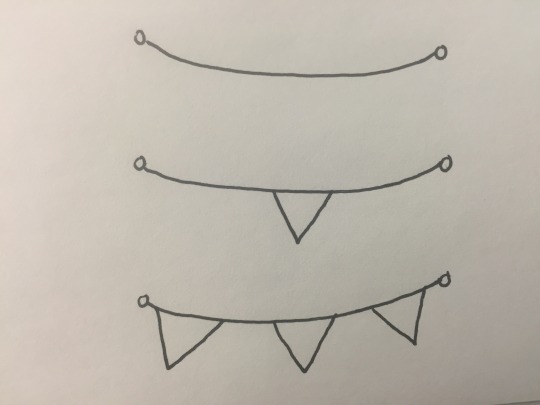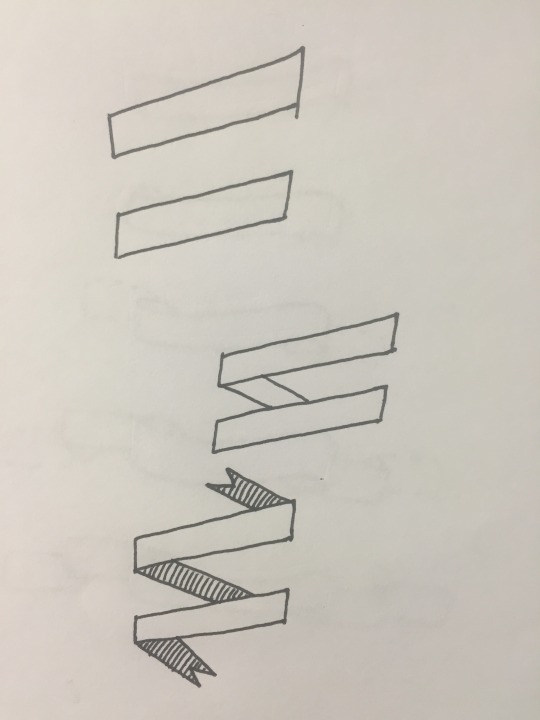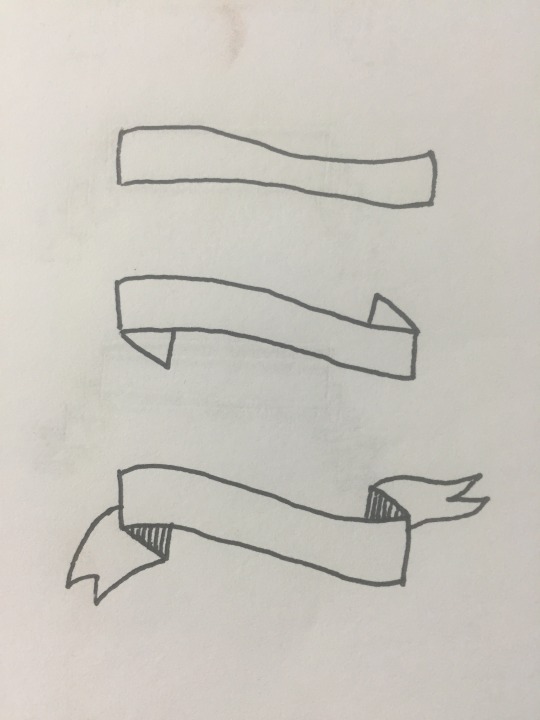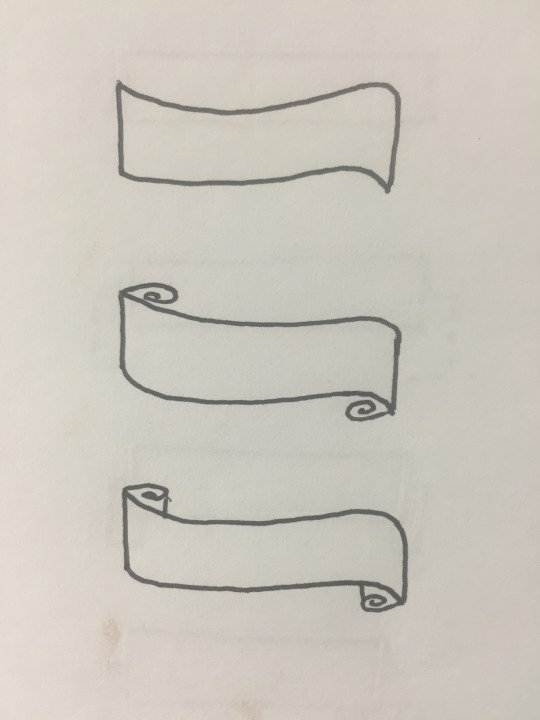Text

STUDIERI ORIGINAL POST 1: SCHOOL SUPPLIES AND STATIONERY
Oh, the joys of buying school supplies! But of course, we shouldn’t spend too much on them, no matter how much we love stationery. After spending so much time looking for good quality supplies without having to overspend, I finally have everything that I need! No, I didn’t buy all of these in one go… I wouldn’t spend that much (lol). Some are gifts, and some had been with me for more than a year!
Here are the school supplies that I’ll be using for this school year, and hopefully, I’ll be able to keep them well until next year, to avoid spending too much.
Just a heads up- the quality of my pictures are kinda low, since use my phone in taking pictures.

I. BINDERS
I’ve used Cattleya notebooks since 7th grade, and the quality is always great. This is my first time using a binder, and it took me more than an hour figuring out how to change the fillers! (If you’re wondering how, just message me!) I bought two binders, the other one for next year if I don’t use it. I wasn’t sure if I only need one. Also bought 3 packs of fillers, for the next semester. I tend to write EVERYTHING down, and then summaries. I end up finishing one notebook in one semester. (oops)

II. ENVELOPE, JOURNAL AND PENCIL CASE
This is the first time I’m using a Limelight brand journal, and a ruled one at that… I’m quite hopeful, that this will be of good quality. Most people would say that buying a white journal is a no-no, but white is really clean and bright, I just couldn’t resist!
Accordion envelopes are VERY important, especially when your teacher gives hand outs of your lectures. Those sheets may seem unecessary, but the moment you see your exams, you would know how important they are. What seems unimportant, becomes a big part of the test. (usually). So keep those handouts! It’s organized, and you don’t lose any paper given.
The denim pencil case is from Muji, a gift from my cousin. It can hold ALL of my pens and markers, which is a lot. And, the zipper never gets stuck. I hate it when I’m rushing to grab a pen and the zipper gets stuck. Trust me, it gets annoying. This pencil case may not be the cheapest, but it works really well. I’ve used this last year, but it’s still good as new!
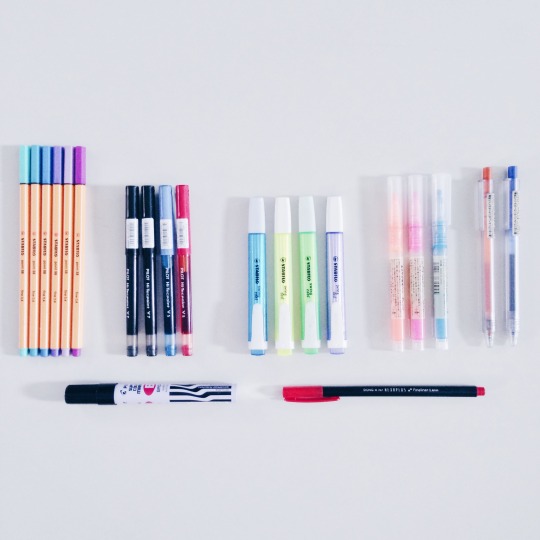
III. PENS, MARKERS AND HIGHLIGHTERS
Markers, pens and highlighters are my weaknesses. I just couldn’t resist. *sob*
Stabilo Fine Point 88 (0.4 mm)- These fine markers are of great quality. I use these for making summaries, reviewers, and for drawings. I rarely write on my books. But when I do, I always use colored markers, to remember important information. They say that the color blue helps in remembering important information, which is why I bought shades of blue. For the purple ones… Well, I like purple, so why not?
Pilot Hi-Tecpoint V5 and V7- These are the pens I use for exams, and the red ones are for checking papers when helping teachers. The quality is good as well, but the paper has to be quite thick so that the ink doesn’t bleed onto the next page.
Stabilo Swing Cool Highlighters- I’ve been using this brand of highlighter for three years, and it hasn’t failed me yet. You know that one person in your class who highlights every single thing? That would be me. I always have that fear of missing a vital information, and that can be my weakness. This highlighter surprisingly stayed alive after I tortured it by painting a whole page neon (lol oops). Anyways, the quality is great, much love for these highlighters.
Muji Highlighters- These highlighters were a gift as well, and I’m impressed by the quality of this. And yes, I’m guilty of using this highlighter when doodling, and overall procrastinating (We all have those days). Some highlighters tend to be too much, and instead of wanting to read them, they end up hurting my eyes. But this highlighter has the amount of eye catching color without hurting people’s eyes.
Muji Hexagonal Retractable Pens- Hexagonal pens give easy grip, which makes this pen really nice. It’s of good quality as well. I’ve been using this pen since last year and it’s still doing great.
Pilot Super Color Broad Marker- I use this when making visual aids for class reports, and the ink is great.
Dong A Hexaplus Fineliner (0.4 mm)- Again, with the hexagonal. Whenever I’m hurriedly taking notes, I tend to have butter fingers and I drop my pen at least four times. I always need to get a grip- an idiom, but at the same time literal. I go hysterical when having to study a very difficult lesson (shoutout to trigonometry, just not my thing). Thus, my reason for always buying hexagonal pens.

IV. PENCILS, CORRECTION TAPES, MARKERS
Faber Castell Econ Mechanical Pencil (0.5 mm)- This pencil has a triangular barrel, for easy grip. I’ve always used mechanical pencil, because I hate sharpeners. They bring terrible memories of having dirt on my fingers every time i sharpen my pencil. I end up smudging them on my uniform… By the walls, that’s disgusting. The quality of this pencil is great, it doesn’t break easily, and 0.5 mm is perfect for drawing my beloved Eren Jaeger! (oops)
Orions Correction Tape- This correction tape doesn’t break easily, which is a good thing. Some correction tapes don’t budge, and when they do, the tape spills out and man, what a mess. It covers the mistakes quite well, and doesn’t leave a trace which is nice.
Muji Hexagonal Twin Markers- These markers have been with me for a year, and they’re still okay, aside from the black marker which ran out right away, probably because I used it for an exam. One side of this marker is fine marker, and the other side is medium marker. One pack has ten markers, and this comes with a hexagon case.
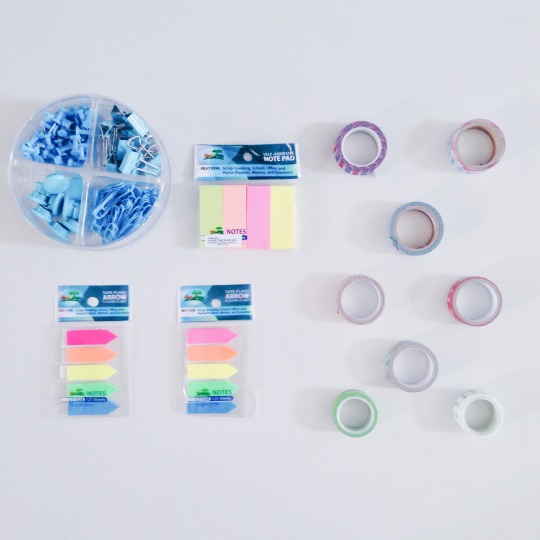
V. PINS, STICKY NOTES AND WASHI TAPES
EasiGet Pins- I bought this pack of pins, magnets and clips for my cork board, which I am decorating and will be posted soon.
Sticky Notes- When we say sticky notes, one would right away think of Post-It brands. But It’s kinda expensive, so I bought an alternative brand. The smaller one is for marking the pages of my books, for review and homeworks. The other, for additional info or terms.
Washi Tapes- These washi tapes were collected over time, because I didn’t want to buy all in one go. Think of it as a reward, like buying one roll of tape for every A+ you get. I’ll be using these for my bullet journal.

VI. HERSCHEL BACKPACK
This is a Youth Settlement Backpack, which is why it’s small for a regular backpack. It’s also a gift, because Herschel backpacks are of amazing quality and with quality comes price. Since I’ll be bringing only a binder and my pencil case for school, this is a perfect one.
That’s all for my school supplies!
Just a reminder that these supplies are only a guide on your way to success, and what matters the most is your effort and dedication in your studies. These Items I’ve bought are rewards for my grades last year. What makes buying these stuff rewarding is when you buy them after working so hard on your studies. No matter how expensive your supplies are, what really counts is your hard work. Don’t think that you need expensive school supplies to be smart, okay? Do your best!
Ganbatte Kudasai!
Love, Eridani.
468 notes
·
View notes
Photo

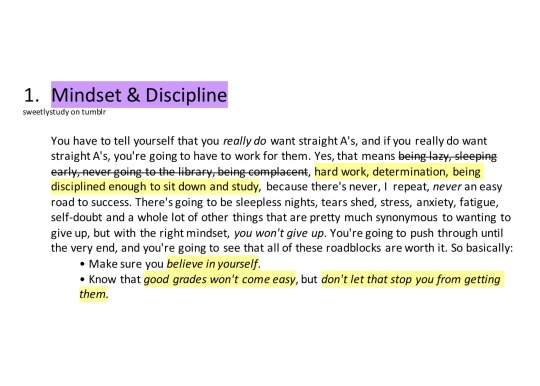
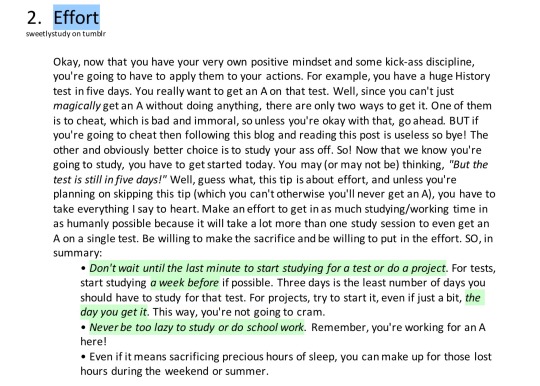

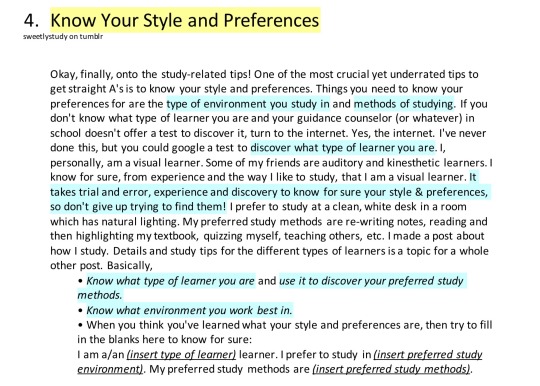
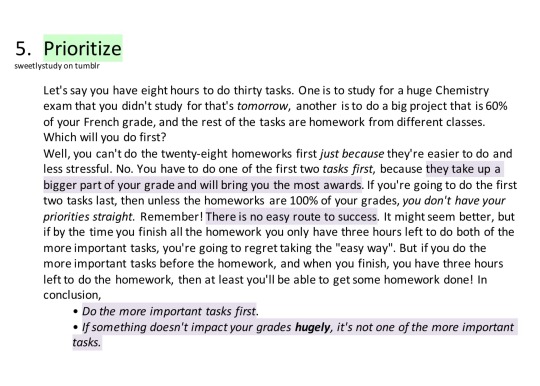

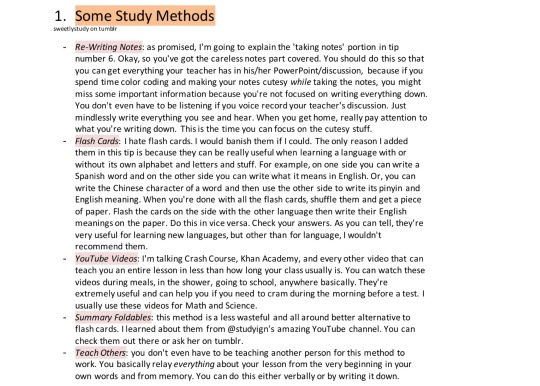
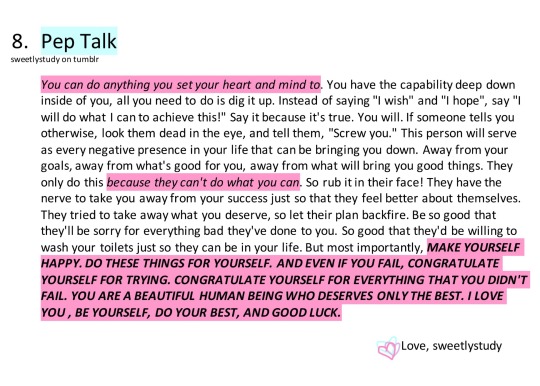
Hey guys! These are 7 (technically 8) tips on how to get straight A’s! I’m sorry for the mistakes — ONE: the tip “Some Study Methods” should actually be number 7, not number 1 hehe. TWO: in tip number 6, “Doing your homework”, it says ‘always remember tip number 6!’ what I mean is *always remember tip number 5!* STUDYBLRS — reblog this for a possible follow hehe (see tip 3). Anyway this whole thing took me HOURS. Hopefully it helps someone! ily all & good luck!
38K notes
·
View notes
Photo

If this is the 700th tumblr post you’ve seen today, you need this post.
Practice Scheduling
Schedule a particular task in the morning and once in the evening.
The task should not take more than 15 minutes.
Wait for the exact scheduled time. -when the schedule time is due, start the task.
Advantages: Scheduling helps you focus on your priorities.
Focus on starting tasks rather than completing to avoid procrastination.
Use Routines
Instead of devoting a lot of hours one day, and none the other and then a few on an another day and so on, allocate a specific time period each day of the week for that task.
Don’t set a goal other than time allocation- simply set the habit of routine.
Apply this technique to your homework or your projects.
Have Daily Scheduling
When you first begin your work day, or going to work take a few minutes and write down on a piece of paper the tasks that you want to accomplish for that day.
Prioritize the list.
Immediately start working on the most important one.
Try it for a few days to see if the habit works for you.
Habits form over time: how much time depends on you and the habit.
Find Successful Role Models
Observe the people in your life and see to what extent self discipline and habits help them accomplish goals.
Ask them for advice on what works, what does not.
Don’t replicate their ideas, come up with your own plan.
1K notes
·
View notes
Photo


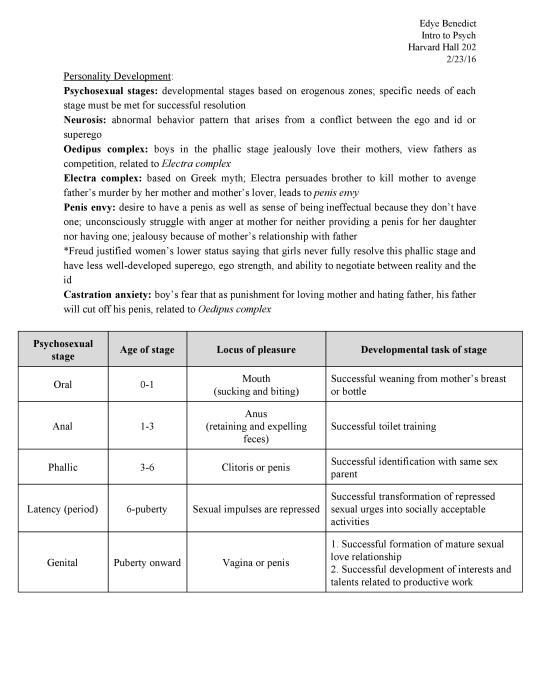

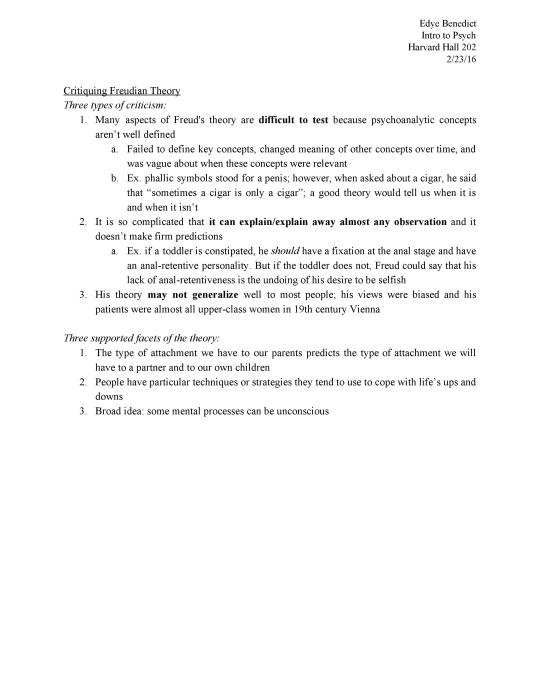
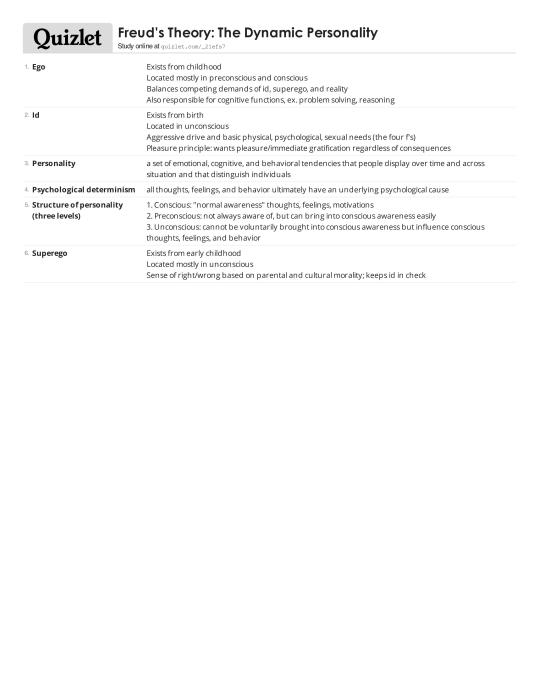
Feb 23, 2016 | As requested, some screenshots of my psych notes this week.
A short textbook note-taking tutorial
I use tables whenever possible to organize materials, and as you can see I format them differently depending on the content they contain. For vocabulary and situations where I’m employing tables in lieu of columns (which conserves space), I’ll make the border white, but for tables like the ones on pages 1 and 2, I’ll keep the border there for definition.
I title each section with the subtitle given in the book and underline it, then make a vocabulary list (bolding terms), and insert my tables. For actual notes (as shown on page 4), I try to keep it as simple as I can with lists instead of blocks of text.
Afterwards, I’ll go into Quizlet and make a set of flashcards (the last image shows the beginnings of what flashcards for this set of notes would look like). I’ll cut out unnecessary content from the notes (and trim examples down to prompts rather than full explanations), and in examples like page 4, I’ll condense each numbered point and its sub-points to the section I bolded, which summarizes the general idea.
Hope this was helpful! If this is received well (gets over 100 notes, let’s say) I’ll continue to post samples and explain my note-taking methods!
6K notes
·
View notes
Photo



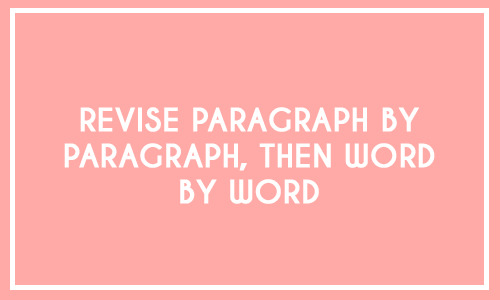
20/02/16 | in light of all the papers that need to be sent in to IB, here are some essay revision tips based on this ask we had a while back! good luck to everyone writing papers right now. you can do this.
6K notes
·
View notes
Photo

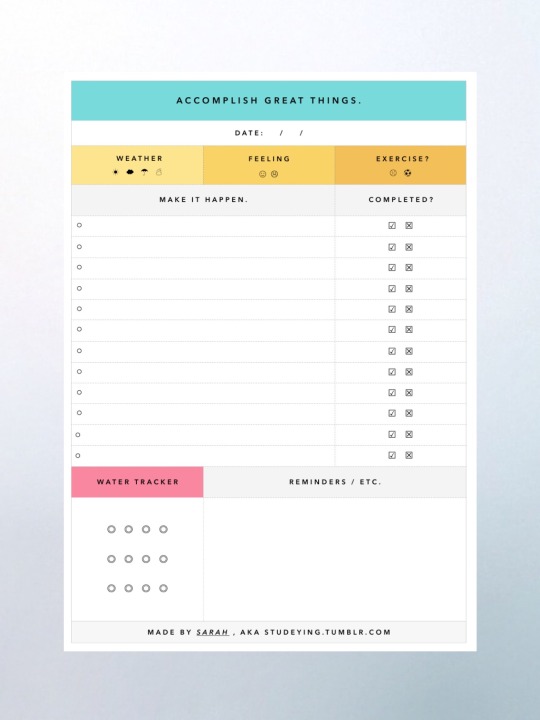


Sarah’s / @studeying to-do list printables! [ tag me with #studeying! ]
I was fiddling around a little, so here are just some to-do lists :-) idkidk hope you guys will use it !! (my other printables)
Download links: (left to right, up to down)
[ one | two | three | four ]
Thank you!
14K notes
·
View notes
Text
Productivity Cycles
It’s been a while since my last text post, so I thought it was time for me to write something again!
You may have noticed that some days, you’re really productive - speeding through readings, super inspired on your essays, and completing all your assignments. On other days, you work, but it’s not quite the same. And then some days, you don’t want to get out of bed, and you feel sluggish and unmotivated. You might get frustrated and wonder ‘why can’t I be productive all the time?’
Here’s the thing: Most of us aren’t built to work 24/7. Productivity levels often fluctuate (sometimes quite wildly, if you’re anything like me).
Find your productive days. These vary from person to person, depending on your work and activity schedule. My most productive days of the week are Sunday, Monday, and Tuesday.
Find your unproductive days. Just like people have productive days, most of us have days where we’re less productive. For me, my productivity dips on Thursday, hits a low on Friday, and starts to go back up on Saturday.
Take into account factors for productivity. My productivity levels take a hit on Thursday because sleep deprivation from school tends to build up at that point in the week, and it doesn’t really recover until I’ve gotten more sleep on Friday night. By identifying these factors, you can better address them (I try to get more sleep earlier in the week so I’m not a wreck by Friday).
Schedule your work strategically. Be realistic! Divide your work so that challenging assignments fall on productive days, and save lighter work for slower days. Try to avoid heavy work loads on less productive days to save yourself the potential frustration.
Find the most productive hours of your day. Lark or Night Owl? Maybe somewhere in the middle? Sometimes we don’t always get a choice in terms of when we work - jobs, extracurriculars, or classes might force you to work at unfavorable times (I’m quite used to the 11PM-1AM homework shift, thanks school!). But most of us tend to cycle in terms of energy levels and focus throughout the day. Knowing when you’re the most productive is very helpful for when you do have free, unstructured time on your hands. Again, schedule wisely! Save demanding tasks (that challenging problem set, a history essay) for peak hours and others (working out, running errands, cleaning, etc) for slower hours.

Above is a graph of my productivity - I’m pretty clearly a morning person (tragically forced to work primarily during the evening ;_;). You can make your own graph for free here.
So yeah! Hopefully this was helpful, and I should really write more posts.
~ Ellie
210 notes
·
View notes
Photo
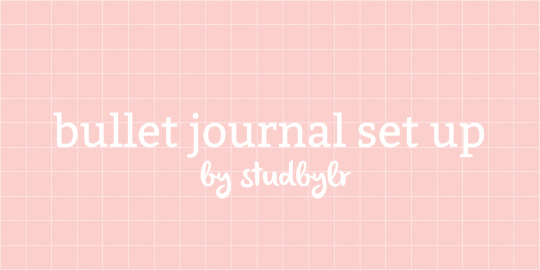





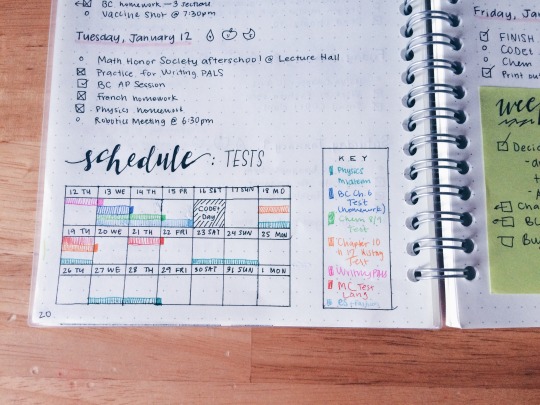
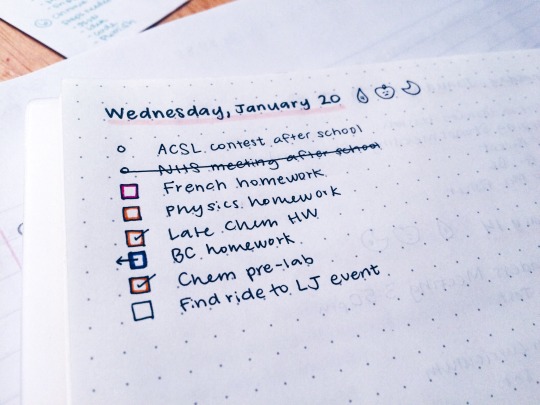
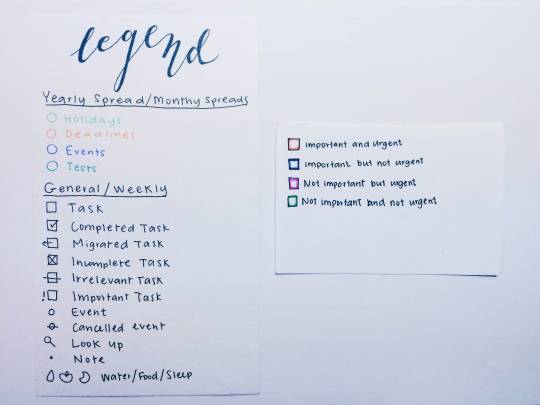
my bullet journal set up
hey guys! i get a lot of asks about my bullet journal so i decided to make a post about my set up and how i use my bullet journal! feel free to send me a message/ask if you have further questions :)
note: i took these pics a while ago it just took me a while to put this post together so all the dates will be kinda old:)
pic 1: materials
these are all the materials that i use. pictured:
muji dot grid journal
love love love the paper and this was only $5.50 at the muji store in nyc!! :’) the only thing i would complain about is that it’s not that durable bc im clumsy and i always throw my things around and im worried this will rip apart on accident
crayola marker
because i’m super cheap and im not ready to get mildliners yet so i just use this old marker for colored accents
muji 0.38 gel pens
my favorite things ever. hands down
uniball signo 207 pen
i like the gel in this pen but holy it skips SO much. it’s really annoying and i can’t believe i’ve dealt with it for so long bc im almost done with it now…this pen used to be my main pen before muji but now i just use it for a “bold” effect
sticky notes
these were cheap (found them in my house) and i like the color pop it adds
white out
definitely necessary bc i always mess up; i think i’ve used it on every page lol:)
not pictured: my stabilo pens. i hadnt used them to set up my bullet journal initially but not i use them for color coding.
i also included my symbols legend. i almost forgot about this because i don’t use it that much since i’ve memorized all the symbols in my bujo, but i just keep this index card on hand in case i have new symbols to add.
pic 2: table of contents
simple table of contents. in hindsight i wish i put this on a right-hand side page like most books are supposed to start so that it would start on an odd page (if u get what im saying?) but thats okay. if i have a lot of lists together, i would group it under one listing.
pic 3: yearly overview
most people just like to put a 12 month calendar with color coded dates for their yearly overview, but i chose to do a calendar and a list describing each thing i marked. this was super helpful for me because i forget everything so i knew i needed a description for all my markings. left side is a 6 month overview with color coded dates circled (see legend in first pic) and right side is a list view of each month with dates and event descriptions under each month.
pic 4: monthly overview
im gonna start with the right side, because that’s the page i set up first. i’m not very happy with the neatness of this page; i wish i left more room for the daily events list on the side! anyway, this page is set up like my yearly overview page, with dates circled and explained on the side. the difference is that i chose to put more specific short term events like deadlines, tests, and appointments. in the bottom left i put goals and tasks that span the entire month, which i wouldn’t be able to include in my weekly spreads.
the left hand page is for any useful notes, monthly tasks, or is simply a goals/planning page. as you can see, i planned a club meeting on this side, and also wrote down some random notes.
this was my first monthly overview page and im not v happy with it; next month i will definitely leave more room for the events list and have more of a focus on my goals.
pic 5: weekly spread
i’ve experimented with this a lot in my old bullet journals and previous pages, but this is my favorite way to organize my week (as of now) because it looks good and i save a lot of time not worrying about perfect calligraphic dates or nice straight lines or cute drawings.
1. write the date neatly in a bolder pen. i use a 0.7mm uniball pen.
2. underline it with a mildliner or a pastel marker. i use a light pink crayola marker.
3. list tasks, events, and notes in a thinner pen. i use a 0.38mm black muji pen.
4. put future tasks on a sticky note and transfer to daily task lists as necessary
pic 6: test schedule
sometimes, having a scattered list of dates and tasks in my bullet journal is not enough, especially when it comes to studying, because i often get distracted by less important immediate tasks, instead of my long term study schedule. this test schedule is super helpful when i have a lot of upcoming tests so i can see what dates are coming up and when i should take time out my schedule to study!
i made a chart of the next three weeks, listed everything i have to study for, marked the dates of the tests, and shaded in every day i was going to study for. this is definitely something i would recommend if you are a visual learner and you’re super forgetful (like me!!)!
pics 7&8: daily task format and symbols legend
after experimenting with a lot of daily task list formats, i like this one the most. i also included my legend last because most of the symbols are only ever used in the daily task lists.
if you’re new to bullet journals, a circle is usually used for events and a box is used for tasks. a “migrated” task means the task was not completed, but it has been moved to be completed on a different day.
for those of you who are familiar with bullet journals, you may notice some symbols that i use that aren’t bujo standard:
water droplet/apple/moon
these are health trackers. inside each symbol, i evaluate each aspect of my health respectively
water: # of cups of water
apple: nutrition. i just put happy or sad faces based on how satisfied i am with my nutrition that day.
moon: # of hours of sleep
colored boxes
these are priority indicators. i include these within boxes when i have a lot of tasks to do, and i like them bc they keep me organized while keeping my bullet journal minimalistic.
i use the eisenhower urgent/important principle to prioritize. you can read more about it here, i might make a post about it soon!
and that’s all! that was a reaaally long post so im sorry if you just had to scroll through all that, but i tried to be helpful based on my experience with a bullet journal. if you take away anything from this post, it’s that i experiment a lot with the style and format, which is actually one of the reasons i love the bujo system. i hope you found this post helpful! reblog or like if you did, and feel free to ask questions in my inbox!
happy studying!
5K notes
·
View notes
Photo






FEED YOUR BRAIN
You can’t expect to get the best out of yourself if you don’t nourish your body properly. Adding these foods to your diet will benefit your study and lifestyle in general, trust me
HEALTHY OILS olive oil, avocado oil, peanut oil etc. — Healthy oils are high in antioxidants such as vitamin E and they boost your memory.
FISH sardines, salmon etc. — Fish is rich in omega-3 fatty acids, which improve memory and focusing!
COFFEE — Caffeine wakes you up but don’t overdo it: 60 ml per day (the equivalent of two espresso) or less is enough to keep you alert, too much caffeine causes insomnia and anxiety and we don’t want that. Don’t like coffee? Try apples instead!
EGGS — A source of energy, they contain proteins and choline (also called “memory vitamin”… the name speaks for itself!)
CHERRIES — By adding cherries into your diet, you’ll get better sleep, since they’re high in melatonin
BANANAS — I’m not kidding when I say I eat a banana a day. They contain magnesium, potassium, folic acid, vitamin B6 and more. What are you waiting for? Go eat a banana, your brain will thank you!
NUTS & SEEDS walnuts, almonds, pistachios, sunflower seeds etc. — Their nutrients reduce stress, boost memory and help your cognitive functions in general
DARK CHOCOLATE — Contains antioxidants, magnesium and flavonoids. It stimulates blood to flow to your brain and lowers blood pressure
AVOCADO — Avocadoes are filled with healthy fats, magnesium and lots of vitamin E. it regulates blood pressure and improves blood flowing resulting in general brain developement and stress to decrease.
BERRIES blueberries, strawberries, acai berries — another food that should never miss in your diet: being high in antioxidants and flavonoids, berries actually do improve your memory and focusing a lot!
LEAFY GREENS lettuce, spinach, kale etc. — these are loaded with magnesium, vitamins, iron… force yourself to eat at least one serving per day (but if you can eat more, then go for it!)
BROCCOLI & ASPARAGUS — these guys are full of folic acid (1 cup = 2/3 of your daily value). Be sure to have your daily dose of folic acid, as it helps relieve stress and depression.
ORANGES — full of vitamin C which is good for your immune system and also helps relieving stress
OATS — oats will boost your serotonin levels, consequently boosting your mood. i personally recommend whole-grains
TEA — green tea is good for focusing and stress relief, but you know what’s even better? black tea!
tips
1. eating colorful is the easiest way to a more healthy diet (same-color foods often share same nutrients)
2. if you’re a picky eater, try disguising tastes with seasonings, spices (and everything nice) or by combining them with foods you like
3. drink water!!! at least 1 L per day!! carrying a bottle of water wherever you go is the trick!
4. plan ahead + prep your meals!! thereby you will avoid that unpleasant “i don’t know what to eat” situation (which often leads to eating junk food :// )
5. make your grocery list before going to the supermarket!!! pros: less time wasted, won’t get distracted by other things you don’t need to buy, know ahead how much $$ you’re gonna spend
6. ALWAYS check the expiration date of products you buy + know when to consume your fruits&veggies
RECIPES
Tbh, when it comes to study snacks im a very lazy person (plus in my world time is money and i hate wasting precious study time) so i usually eat rather simple dishes. Then, what do i prep when i feel more creative?
FRUIT SALAD (easiest snack ever tbh everyone can do this no matter how bad u are at cooking)
all you need is
love
fruit of your choice
(optional) cocoa powder / cinnamon / lemon juice
what u gonna do now
wash the fruit, peel it (if needed) and then slice it
put everything in a bowl and it’s good to go
BUT if you want, you can add cocoa powder, cinnamon or lemon juice for extra flavor. use your creativity, (almost) anything can work!
i love fruit salads bc they’re healthy, easy + quick to make (not to mention super delicious)!! here you can see one i made w/ strawberries and cocoa powder
FRUIT PARFAIT (another easy option, but a more creative one *sunglasses emoji*)
all you need is
fruit (u don’t say)
oat bran
yogurt
what u gonna do now
wash, peel and slice the fruit
grab a tall glass/mug/whatever and make the first layer with fruit
then add the yogurt for the second layer
third layer is going to be the oat bran
depending on the height of the glass/mug, you may go on w/ the layers
this is optional but you can add toppings if you want to make it look even cuter (and yummier)
what i like about this big bad boy here is that it’s SO fulfilling!!
BAKED PUMPKIN SEEDS (for my savory lovers out there)
all you need is
pumpkin seeds
thats it. thats all u need
what u gonna do now
take a pan and cover it with baking paper
place the seeds on the paper and cook in the oven for 20 mins at 200°C
done!! B)
super simple, isn’t it? and guess what? they actually taste like popcorn!! no lie!!!
BAKED ZUCCHINIS
all you need is
zucchinis!
lemon juice
pepper
what u gonna do now
wash and slice the zucchinis french fry style
put them in a bowl, add lemon juice + pepper and mix all well together
cover a pan with a sheet of baking paper and place the seasoned slices
cook in the oven for 20-30 mins at 200°C, flipping them over when they’re half done
now you have a more healthy and tasty version of french fries to eat while studying!
(on a side note: you can’t even imagine how painful typing ‘zucchinis’ was to me)
OATMEAL BANANA COOKIES (my fave!!)
all you need is
oatmeals
a banana
cinnamon or cocoa powder
what u gonna do
peel and slice the banana
smash the banana w/ a fork in a bowl, then add the oatmeals + cinnamon/cocoa powder and mix
cover the pan w/ your trusted baking paper. using a spoon, place the mixture on the paper forming little circular shapes (they don’t have to be perfect)
cook in the oven for 20 mins at 200°C (remember to flip them over at the 10mins mark)
let them cool off for 30-40 mins and they’re ready to eat!
these take quite a bit but you can prep them before starting to study, then you do your revision/practice while you wait for them to cool off and finally you can take a break + enjoy them!
more recipes
10 smoothie recipes
healthy study snacks
22 healthy snack ideas
10 healthy snack ideas (vegan)
snacks for students 1 2 (!!!!)
frushi (fruit sushi!!) recipe
muffin recipes 1 2
black bean wrap
caramel cashew chocolate cookies (gluten-free)
10 healthy pancake recipes
2 ingredients pancakes (!!!!)
easy cheesecake (vegan)
avocado + tomato toast w/ balsamic drizzle
more links
my food tag
staying healthy in college
minimalist baker
the domestic geek
fablunch
cheap lazy vegan
food masterpost by @studiyng
stay sated whilst you’re motivated by @areistotle
how to save money on food by @studybudyblr
10 study snacks by @saturdaystudying
pictures credits: { 1 2 3 4 5 6 7 8 9 10 11 12 13 14 15 }
19K notes
·
View notes
Text
A Stash of Tiny Study Tips
STAYING MOTIVATED
Create realistic goals: get ___ grade on next ____
Manageable let down; get back on track
Keep track of grades: focused, know where stand, no surprises
Start small
Low risk confidence builders
Take time to relax/give self rewards
Days off, breaks, rewards
All work & no play =/= living
Little organization goes a long way
Reward achievements!
Keep balance with exercise, clubs, friends
2h/d: friends and exercise
Remember that hard work pays off
Isn’t a breeze to try to get a 4.0 GPA; but it’s possible
You’re smart enough and can achieve it
90% there with these tips, 10% is just pure hard work
Only chill on weekends
Monday-Friday: school mode
Have time for some fun
If work as hard as should during week, will need weekends to blow off steam
Be self-motivated
Grades can matter, not everything, but follow through on what needs to be done
Not most important part of college but underperform? You will regret it
GPA cutoffs exist and matter to employers
College is full of distractions and opportunities
Nobody will hold hand and the work will suck but all the prouder of yourself to be
Suck it up, buckle down, get it done
If think need break, probably don’t
Turn off the little voice
Realize not alone in questioning ability
Avoid people who tend to burst bubbles no matter what
Physical triggers to stop
Incentive to get something done when know have something else during the day
Don’t have a gaping abyss of study time
Work has to get done, in the end
Books, examiners, and especially your future self isn’t going to care about your excuses for not doing the work
Take the first step
It will almost be fictional how hard you thought the task was going to be
Just keep going because you simply can’t afford NOT to do anything today, nonzero days
Leeway, don’t give your perfectionism control over your life
MUNDANE HABITS
Sleep! Think and function, mind & body
CAN sleep if keep up with coursework instead of procrastinating
Will miss out on some fun stuff
Need to stay awake in class
Figure out what need for full speed
Stay relaxed
Stay physically healthy
Diet and exercise
1 hour exercise during week
Weekends off
Traditional breakfast not necessary if value extra sleep
Systematic habits: neat, prepared
Master material
Look for real world applications
Learning is a process: be patient, don’t expect to master off the bat
Designate study area and study times
Do trial runs
Practice tests
Ask a TA to listen to your oral performance
Study groups
Don’t copy other people’s psets and solutions
BEFORE SEMESTER
Spiral bound notebook, can color code with folders/etc if need be
Lecture notes: front to back
Reading notes: back to front (if fall behind on)
Seminar notes: mixed in with lecture notes, different pen color/labeled
Outline format
Bullet points for everything
Same NB for one set of class notes, separate notebooks for all classes
5-subject notebook
Midterm and exam material in it
Mesh sources, study guide
All study material from week/month in one place
Pick the right major
Indulge in favorite hobby feeling
Pick professors & classes wisely
Take a small class
Pick classes that interest you so studying doesn’t feel torturous
Want to learn
GRADES SPECIFIC
Prioritize class by how can affect GPA
More credits: more weight
Work enough to get an A in your easy classes: take something good at
Don’t settle, don’t slack off, don’t put in minimal effort to get that B/C. Just put in a tiny bit more effort to ensure A
Will have harder classes and need to counteract
Take electives can ace
Anything but an A in an elective is kinda mean and an unnecessary hit for your GPA
FIRST DAY/WEEK/HALF OF CLASSES
Get to know teaching style: focus most on, lecture/notes
Pick and follow a specific note taking format
Outline
Date each entry
Capture everything on board
Decide productivity system
Google Cal
Todoist
Agenda: remind meetings, class schedule, important dates/midterms/quizzes/tests, no homework
Always wanted to be prepared
Rarely last minute
Have plan, stay focused
Homework notebook
Good redundancy
Study syllabus
Know it thoroughly
Plot all due dates after class
Penalize if fail to abide by
Study the hardest for the first exam
Seems counterintuitive
Hardest/most important test
Pay attention to content and formatLess pressure: just need ___ on final to keep my A
Easy to start high and keep high
Go into crunch mode at the beginning
End softly
Get plenty of sleep, exercise, and good food in the finals days before the exam
DURING SEMESTER: PEOPLE
Get to know professors: go to office hours, care about grades/course/them
Easier ask for help, rec letter
Get to know interests and what they think is important
Figure out their research interests, 60% of their job is research
Learning is dynamic
Discussion helps
Get feedback early when not sure what doing
Take comments constructively
Consistent class participation: ask questions, give answers, comment when appropriate
Understand material
Find a study buddy in each class: don’t have to study with
Somebody can compare notes with, safety net
Pick somebody who attends, participates, and take notes regularly
Make some friends
Participate as fully as can in group activities
Be involved
Learn – not be taught
Be punctual
Good impression, on human professors
DON’T BE LATE
Skipping class =/= option: It’s “cool” to get attendance award
Make all the classes: it’s hard to feel confident when missing key pieces
Get full scope of class, everything will make a lot more sense and save a lot of time in long run
Mandatory class: higher graduating cumulative GPA
Go to class when no one else does/want to show up, reward
Get to know professor, what’s on test, notice, r/s build, material not in reading
Unless optional and super confusing professor
Sit in one of the first rows
Don’t fall asleep
Fake interest if you have to
Tutors
DURING SEMESTER: THINGS TO DO
Take notes! Provided is bare minimum, accessed by students who aren’t attending lecture
Based on lecture and what read –> test; it’ll be worth it
Write it down
By hand
Bored? Doodle instead of going online
Read all assigned–even if need to skim
Seems cumbersome and maybe impossible
Figure out what’s important
Look at the logical progression of the argument/what’s important/what trying to prove
Understand everything that you do read–even if don’t read everything
PIck 2 examples from text per topic
Complete course material on time
DO NOT WAIT UNTIL DAY BEFORE IT IS DUE
Begin as soon as possible
Sometimes it’s just straight up impossible
Have it look attractive
Library doesn’t just mean = study
Social media in the library is still social media
Confusion is terrible
Read other textbooks, review course material @ another uni/by another professor, google the shit out of it
Review
Do not wait, do throughout semester
Exam prep
Ask for model papers, look at style & structure, thesis, how cite
Get old tests
Look at type of questions (detail level and structure)
Can solve old exams cold
If give out paper exams in class: probs won’t repeat questions, focus more on concepts but still learn the questions
Have class notes and psets down cold
Do all the practice problems
Read through notes a few times; rewrite into a revision notebook
Highlight major topics and subtopics
Different highlighter for vocab terms
Overall picture, go from concept to detail
Look at overall context and how specific idea fit into whole course
Ideas, don’t memorize all your notes
Better understand = more able to use and manipulate info and remember it. Understand = manipulation.
Charts, diagrams, graphs
Lists
Practice drawing labeled structures
Flash cards for memorization
Every school requires some degree of grunt memorization
Say it aloud, write it down
Get friends to quiz you
Self-test: severely challenge self, have a running collection of exam questions
Explain difficult concepts to your friends; force yourself to articulate the concept
Never pull an all-nighter
Do not spend every hour studying up to the exam
Eat, shower, sleep
Don’t wait until night before exam to study
Prep takes time even if reviewed throughout semester
Ask about format–don’t ask the professor to change it for you
Law of College: it will be on the exam if you don’t understand it
Ask professor, internet, textbooks
Night before exam
Jot what want to remember/have fresh
Read through in morning/before exam
Physical prep
Sleep, have test materials
Day of exam
Don’t cram every single spare minute
Go to bathroom before exam
Never miss an exam/lie to get more time
You won’t be any more ready 2-3 days after when supposed to have taken it
Slay exam. Get A.
WEEKLY
Friday morning: go through each syllabus, write down in HW notebook
All hw during weekend; study/reading assignments during week
Save everything
Divide big tasks into small pieces to help propel self
Standard study schedule: block off lectures, labs, regular commitments
Note the weeks that have assignments and tests that will require extra studying
Don’t oscillate too heavily every day with study times (i.e. don’t study 2-3 hours for weeks and then 10-12 hour days right before an exam)
Eat and sleep to make more extended work periods liveable and enjoyable
DAILY
Set an amount of time would like to study every day
Try to study most days
Avoid vague/zoned out studying –> waste of time
Do a little bit daily but don’t let studying be your whole day
Review notes: 30mins/day, each class from that day
Look at important ideas/vocab
Prioritize new vocab because language is most fundamental and important tool in any subject
Circle abbreviations and make yourself a key somewhere so you don’t forget what the hell that abbreviations meant
Check spelling
Rewrite/reorganize notes if necessary
Format of ideas is just as important as the concepts themselves, esp. when it comes time for exam review
This helps you retain the material so you’ll be ahead next time you walk into class
Chance to ID any knowledge gaps that you can ask about for next class
Keep up with reading
Skim text before lecture or at least main topic sentences
Jot down anything don’t understand; if lecture doesn’t clarify, ask the professor
After lecture: skim again, outline chapter, make vocab flashcards
Highlight similar class and lecture notes
will definitely be tested on
Review and make study questions
Study
Disconnect from anything irrelevant to study material: help focus and your GPA
Don’t limit studying to the night
Study whenever, wherever between classes
Variety helps focus and motivation
Especially if tired at night and can’t transition between subjects
Try to study for a specific subject right before/after the class
28K notes
·
View notes
Note
hi, how to study smart?
Hi!
To be honest, I’m not sure you could call the way I study “smart.” But basically, this is how I study in a nutshell:
Do assignments/problems, review lecture notes, complete exam study guides. Don’t wait until the last minute because that’ll overwhelm you.
In classes like my anatomy class where my professor posts a study guide that goes along with the book, I do one of two things:
1) I’ll print it out in 1.5-space/double space and write in information by hand. I like this because I am physically writing things down rather than typing them, which I find helps me learn better.
2) Since my study guides are given to me in the form of a word document, I’ll add comments (Ctrl+Alt+M) with the answers to the questions/prompts. This way, when I’m reviewing before the exam, I can see the question and try to answer from memory, then hover over it and see the answer I wrote.
Assuming my class has 3 or more exams (and hoping that one of them is dropped…), I overstudy for the first exam in particular. From this first exam, I can then better gauge what kind of exams the professor will give in the future. For example, one of my professors usually pulls questions from the book that weren’t assigned as homework. He would also tell us what kind of questions would be on the exam, so I make sure to look at the questions in the book that weren’t assigned but are of the type he said would appear.
Talk to people who had your professors in the past and ask them about his/her exams. Also make sure to pay attention in class for what to focus on, as professors will sometimes tell you.
Notecards are your best friend.
Study with classmates as long as you know that you guys will ACTUALLY study.
Don’t study while distracted.
Eat beforehand or bring snacks.
Make sure your study space is well-lit, is clear of clutter, and doesn’t have people/things that distract/annoy you.
Check that you have sufficient time to really get into studying! If you don’t have that much time, perhaps just grab some notecards to reinforce some small things.
Start early.
Seriously, start early.
74 notes
·
View notes
Photo



How to study effectively and have a great school year
A few weeks ago I uploaded an evaluation of my study habits during the first semester of 2015 and, since then, I have received a few messages from people that have the same or similar struggles.
The purpose of this post is to help those people with the mistakes that are not easily fixed. I will approach other common mistakes and bad habits, too.
So… How to study effectively and have a great school year?
1. Have a progress journal, not a planner.
I have spent way too much time trying to keep up with a planner. One hour every Sunday trying to figure out what to do during the week, only to have my entire schedule messed up by a single event.
Instead, try to create a more effective system:
For homework, projects and other things that you have to present to the teacher: try to do everything on the day you are given it; if you can’t, write it on a post-it note, stick it somewhere in your room where you’ll see it and make sure to finish it within a week. Sounds extreme, but it’s actually the best way to get things done.
For personal goals, things that require constant effort or that need to be done on a daily basis (self-studying a language and exercising, for example): literally graph your progress. Every week, write down what you need to do on a piece of paper and draw seven squares next to it. Colour a square whenever you finish the task.
2. Stop obsessing over perfection.
Getting your perfectionism under control doesn’t mean you have to start bs-ing your academic life. It means your notes have to be neat, not pretty. It means you have to give your best, but not freak out when irrelevant things go wrong.
I get we all want our notes to look like the ones we see on tumblr, but we need to understand that spending three hours summarizing a 50 minute lecture is not reasonable. Your blog aesthetic is not more important than your education.
Don’t be so hard on yourself. I used to think this was a quality, but being so anxious you puke and crying for a whole afternoon because you messed up a little bit is counterproductive and unhealthy.
3. For real, don’t be so hard on yourself. Have some self-esteem.
I have lost count of how many times I cried/felt bad because I wasn’t as smart as others or because I didn’t do well on a test. I’ll not even go into why this is unhealthy.
Don’t waist time you could be using to improve yourself to depreciate yourself.
4. Be reasonable and have control over your life.
Sure, we’re young, but this doesn’t mean we have to be immature. A lot of mistakes I made were due me not taking action and waiting for others to notice wrong things and fix them for me.
If you are mentally unstable, go to a doctor asap. Have daily moments of introspection and seek help when something feels wrong. You have to take care of yourself, this is nobody else’s job.
Same for your physical health.
You shouldn’t be drinking so much coffee and you know that. Stop.
You should be eating healthier and you know that.
You should be sleeping more and earlier and you know that too.
Don’t wait a small problem become a big one to take action. Fix things as fast as you can, always.
Stop neglecting yourself.
5. Some final tips
Don’t hate any of your teachers. Do your best to like all of them, pretend for a while if you have to.
Don’t skip class just because you think it’s not important. I lost a lot of important classes because I thought I would be able to study the subjects by myself.
Exercise often.
Don’t ignore your doubts, you’ll probably have to deal with them later.
ASAP is your new goal. Do everything as soon as possible.
That’s it. If you are too lazy to read the entire thing, I can sum it up for you: quit being a baby, grow up and fuck off.
10K notes
·
View notes
Text
A Visual Learner’s Guide to Textbook Note Taking

Read the textbook before taking notes. The purpose of note taking is to synthesize information, not writing every fact that comes your way. Reading the book first allows you to discern what information is useful and what isn’t.
Don’t take traditional notes. In other words, don’t just write your note down the page with bullet points and whatnot. It’s a good way to organize information (at least, while you’re taking them), but it doesn’t make use of spatial memory. And since everything looks the same in rows, it’s harder to pick out specific points so you’d probably be better off just rereading the book.
Make use of space. Don’t just write down the margin. Make webs, boxes, bubbles, anything to help you further organize information. By doing it on paper, you’ll do it in your head.
Doodle. Seriously, do it. Draw pictures, sketch diagrams, make silly stick figures saying silly things. It’ll give you a sense of context and drawing it out will make you remember it longer.
Use arrows. You probably already do this. It helps flow your notes for your eyes and brain.
If possible, use color. Not only does it make your notes more exciting, but you’ll be able to associate and organize information better mentally (e.g. color coding “Ferdinand” and “Frederick” in AP Euro notes so you don’t mix up the two). It’s preferable to use a color scheme so your page of notes doesn’t look as if a unicorn barfed all over it.
Insert personal thoughts. Be weird. Weird things are easier to remember.

4K notes
·
View notes
Photo

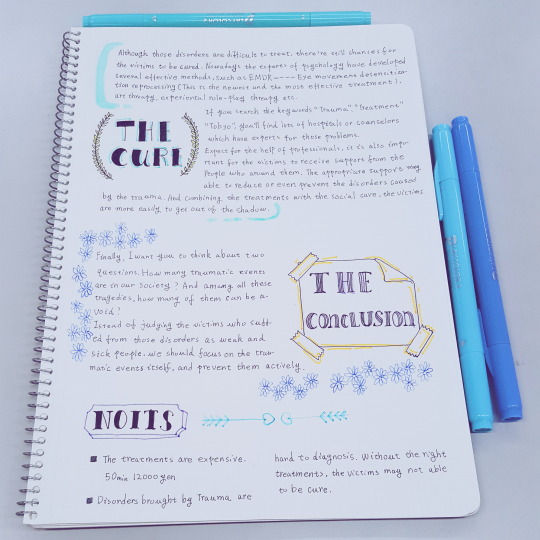



Script.
I don’t think I can post the next week,my brain is dead.I just finish my first internship(Johnson & Johnson)this Saturday and finish four missions for Nestle.Still four missions left.
2K notes
·
View notes

